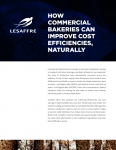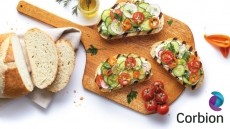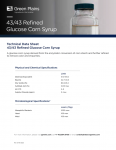DSM gains application IP rights for asparaginase use
Proctor & Gamble that gives it intellectual property rights to
use asparaginase, the enzyme that underlies its
acrylamide-reducing PreventASe preparation, in food products.
The PreventASe enzyme comes from the micro-organism Aspergillus niger, and is descibed as an "asparaginase enzyme preparation". A spokesperson for DSM told FoodNavigator.com that while DSM held development intellectual property rights to the enzyme, the application rights for food were held by Frito-Lay and Proctor & Gamble. The successful outcome of negotiations with the food firms gives DSM a worldwide license to these rights, and means PreventASe is a step closer to being used in food products on the market. DSM plans to sublicense the application rights to its clients - food manufacturers. The DSM spokesperson was unable to comment on any possibility of Frito-Lay or P&G using PreventASe in their products. Until now manufacturers of baked goods have sought to reduce acrylamide formation by reducing either the sugar or the heat in the production process, DSM told FoodNavigator-USA.com earlier this year, but this can alter the taste of the product. PreventASE is billed as a way to reduce acrylamide formation without impacting the all-important sensory properties. "The enzyme converts one of the precursors of acrylamide, asparagines, into another naturally occurring amino acid, aspartate," DSM said. "As a result, asparagine is not available anymore for the chemical reaction that forms acrylamide when carbohydrate-containing foods, such as bread, cake, cookies, potato chips and cereals, are being heated." A wide range of cooked foods - prepared industrially, in catering, or at home - contain acrylamide at levels between a few parts per billion (ppb) to over 1000 ppb. The foods include bread, fried potatoes and coffee as well as specialty products like potato crisps, biscuits, crisp bread, and a range of other heat-processed products. Acrylamide hit the headlines in 2002 when scientists at the Swedish Food Administration first reported unexpectedly high levels of the potential carcinogen in carbohydrate-rich foods cooked at high temperatures. Until then acrylamide was known only as a highly reactive industrial chemical, present also at low levels for example in tobacco smoke. Since the Swedish discovery a global effort has been underway to amass data about this chemical. More than 200 research projects have been initiated around the world, and their findings co-ordinated by national governments, the EU and the United Nations. Acrylamide appears to form as a result of a reaction between specific amino acids, including asparagine, and sugars found in foods reaching high temperatures during cooking processes. The process is known as the Maillard reaction. This occurs at temperatures above 100°C (212°F). In Australia and New Zealand, Novozymes has applied to use the asparaginase enzyme as a processing aid with the intention to supply the food industry, according to Food Standards Australia and New Zealand. It was not known at time of publication whether Novozymes has also obtained application rights from the IP holders. Asparaginase is produced using DNA techniques from a strain of the host micro-organism Aspergillus oryzae, and converts asparagine to aspartic acid to reduce acrylamide formation in baked or fried wheat dough based products. PreventASe was granted GRAS (generally recognised as safe) status in the US in May. In most of Europe it is not necessary to seek regulatory approval for enzymes as processing aids. One notable exception to this France, where DSM has filed a dossier. This article was updated following publication of erroneous information. FoodNavigator.com apologies for any confusion caused.













